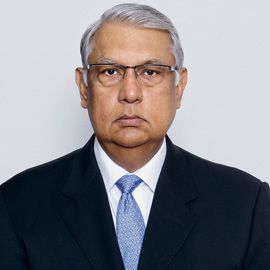China-Bangladesh bonhomie: India needs to restrategise as the Dragon woos this neighbour

Chinese President Xi Jinping is on a historic two-day visit to Bangladesh after his visit to Cambodia and before he lands in Goa for the BRICS Summit. Xi will be the first Chinese head of state to set foot in Dhaka after 30 years.
The growing Bangladesh-China bonhomie is being keenly watched over and Indian media commentary has provoked the Chinese media to taunt India asking Bangladesh's neighbour not to be "jealous", about the closeness between the two countries.
The Chinese media has also gratuitously remarked that India has nothing to fear from a closer relationship between the two countries.
Expectations from the visit have been hyped up in both countries with the obedient Chinese media issuing a verdict that the visit will raise international ties to new heights, as large Chinese investments and loans for building infrastructure are likely to figure in bilateral agreements. The visit has indeed produced 27 agreements and the leaders have inaugurated six projects.
As expected, in the joint statement Bangladesh-China have also agreed to jointly advance the OBOR initiative, apart from "institutional cooperation" on maritime issues and counterterrorism. China's strenuous efforts in wooing Bangladesh is driven by various strategic and economic factors. It is an essential component of China's concerted move to woo India's neighbours and drive a wedge between them.
The plan is to use China's financial and military muscle, notwithstanding the disappointment of losing its protégé, the former Nepalese PM KP Oli who made no bones about his pro-China and anti-Indian views.
Oli's successor, Prachanda was not only instrumental in ousting Oli but also decided to visit Delhi first, before visiting Beijing. This visit irritated China to such an extent that President Xi cancelled his visit to Kathmandu on rather flimsy grounds.
Picking sides
A rising China has steadily used its economic and military clout to woo India's neighbours and incorporate them in its ambitious 'One Belt, One Road' project (OBOR).
Infrastructure development by China has always played an important role in its aid to India's neighbours. In Bangladesh, China has built friendship bridges over the many rivers that crisscross the deltaic country, winning favours with the Bangladeshis.
China has had to live down its negative image in Bangladesh for having opposed the country's War of Liberation and siding with a genocidal Pakistani military junta.
In Bangladesh, China has had to slowly cultivate the image of a friendly country and Bangladesh today seems to have forgiven China for its role during the 1971 War of Liberation and sought closer ties with them to counter India.
It remains enthusiastic about the Bangladesh, China, India, Myanmar (BCIM) corridor which, if implemented, could become the eastern arm of economic corridors that ends in the Bay of Bengal. China's push to build a deep water port in Bangladesh is an integral part of this initiative.
Counter India
For China, the collateral objective of wooing India's neighbours has always been to box India within the sub-continent.
The Chinese media has not been coy about admitting that closer Bangladesh-China relations will put pressure on India to rethink its policy on OBOR and put more effort in improving relations with China, during the forthcoming BRICS Summit. Bangladesh, Sri Lanka and Pakistan are all enthusiastic about OBOR.
China put all its strategic eggs in the Pakistan basket decades ago, recently pledging to invest $46 billion (around Rs 3 lakh crore) in the China-Pakistan Economic Corridor (CPEC). The CPEC will be starting from the province of Xinjiang and terminating at the port of Gwader, on the Makran coast of Balochistan.
The CPEC is the culmination of China's strategic ties with Pakistan that began in the late 1960s and early 70s when China opposed Bangladesh's War of Liberation and supplied Pakistan with nuclear weapons and missile technologies. China's and Pakistan's objectives have converged and there are no prizes for guessing that the target is India.
India has opposed the OBOR project's CPEC component not only because it cuts through India's territory in POK, but also the ultimate goal of making Gwader a Chinese naval base. Bangladesh, therefore, has also become a factor in China's policy, in indirectly upping pressure on India.
The arsenal
China's military ties to Bangladesh have also expanded and the Bangladesh defence forces mostly operate Chinese manufactured military equipment, sold to them at cheap prices.
Buying influence with an institution by selling military equipment has been a consistent feature of China's policy. China has supplied submarines to Pakistan and Bangladesh which has added a sharper edge to Indian security threat perceptions.
The Chinese media has tried to debunk these worries, asserting that by looking at the OBOR initiative as a political tool to achieve Beijing's strategic objectives is far too simplistic a view. They have also taken a dig at India, propagating the view that those in India are mistakenly flattering themselves by assuming that China's moves are aimed at countering India.
Beijing and its obedient media have adopted a derisive attitude to the Indian media reaction. Being derisive displays a degree of apprehension with an element of false bravado.
Changing equations
As global power equations changed, China increasingly flexed muscles to seek hegemony in Asia.
It bullied all littoral countries in the South China Sea (SCS) by making egregious claims over large stretches of the sea. It rejected the award shunning its claims in the SCS. It has provided unstinted support for Pakistan's sponsoring of terrorism against India and has made the country a client state.
These added to the growing misgivings about China's intentions.
No amount of sweet words emanating from Beijing and the lap-dog Chinese media have been able to assure other Asian countries that China is not being aggressive. The current reality is, that except for Pakistan and North Korea, China's cheerleaders in Asia are few. Despite China's persistent attempts to directly bribe many Asian leaders to change their policy and align themselves with China's strategic objectives which, in other words - means Chinese hegemony - they have not succeeded much.
Hopes on Bangladesh
The murmur of taking Bangladesh-China ties to new heights has risen in crescendo steadily in Bangladesh as well. PM Sheikh Hasina has described China as a "trusted partner" and had said that Xi's visit would elevate bilateral ties by fulfilling the country's need for enhanced cooperation in trade and investment.
The joint statement issued says that the two countries have agreed to
elevate China-Bangladesh relations from a closer comprehensive partnership of cooperation to a strategic partnership of cooperation. They also have agreed to increase high level exchanges and strategic communication so that their bilateral relations continue to move ahead.
PM Hasina has been instrumental in guiding Bangladesh-India relations away from the sterile era of non-cooperation on strategic issues. The signing of the Land Boundary Agreement was an important milestone, as was the resolution of the Maritime Border dispute.India has been generous in extending lines of credit worth $2 billion (around Rs 1 lakh crore) to Bangladesh for a variety of railway projects and two premier projects - the Ganga Barrage and the Padma Bridge.
Funding has also been promised by China and Japan for these mega projects, apart from promises of funding for the deep sea port that has been on the drawing board for decades. Bangladesh lacks one and as Bangladesh's economy grows at an impressive 7% per annum with exports of over $60 billion (around Rs 4 lakh crore).
Bangladesh has emerged as the geo-strategic contender for the attention of major countries in Asia with competition growing between China, India and Japan for infrastructural projects.
It seems clear that Bangladesh is leveraging its ties with both China and India for achieving its national goals of development while avoiding getting embroiled in the China-India rivalry.
India must expect this to continue and factor it into its neighbourhood policy. The growing footprint of China requires calibrating India's neighbourhood policy as Bangladesh navigates complex ties between the two Asian giants.
(The writer is a Distinguished Fellow at the Delhi-based Observer Research Foundation, a former Secretary in the Ministry of External Affairs and a former High Commissioner to Bangladesh)
Edited by Jhinuk Sen
First published: 14 October 2016, 10:35 IST






![BJP's Kapil Mishra recreates Shankar Mahadevan’s ‘Breathless’ song to highlight Delhi pollution [WATCH] BJP's Kapil Mishra recreates Shankar Mahadevan’s ‘Breathless’ song to highlight Delhi pollution [WATCH]](https://images.catchnews.com/upload/2022/11/03/kapil-mishra_240884_300x172.png)

![Anupam Kher shares pictures of his toned body on 67th birthday [MUST SEE] Anupam Kher shares pictures of his toned body on 67th birthday [MUST SEE]](https://images.catchnews.com/upload/2022/03/07/Anupam_kher_231145_300x172.jpg)






